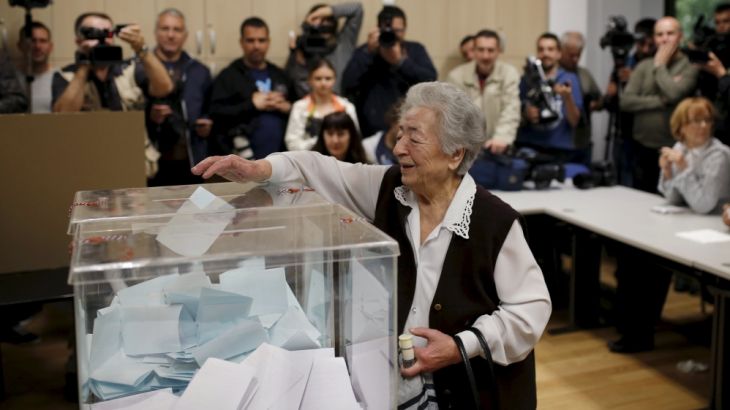Serbians vote in snap parliamentary poll
Election seen as de facto referendum on PM Vucic’s bid to lead Balkan nation towards European Union membership.

Polls have closed in Serbia after parliamentary elections that are seen as a de facto referendum on Aleksandar Vucic’s effort to lead the Balkan nation towards European Union membership.
Opinion polls suggested voters were set to grant the incumbent prime minister’s pro-EU Serbian Progressive Party four more years in power on Sunday, but he would probably have to contend with a resurgent ultra-nationalist opposition demanding closer ties with Russia.
About 6.7 million people were eligible to vote.
![Serbian Prime Minister Aleksandar Vucic called for a snap election in January [Marko Djurica/Reuters]](/wp-content/uploads/2016/04/ca4ab9c3469c43b0839842c6626dd012_18.jpeg)
Parliamentary elections were originally due to be held by March 2018. However, Vucic called for a snap election in January claiming Serbia “needs four more years of stability so that it is ready to join the European Union”.
Analysts believe Vojislav Seselj, a nationalist who was acquitted by the UN tribunal in The Hague last month of war crimes during the 1990s break-up of Yugoslavia, could emerge as the effective leader of the opposition.
His ultra-nationalist Radicals, who oppose EU membership and favour closer ties with Russia, are tipped to become the third largest party, returning to parliament for the first time since 2012.
The ultra-nationalists may complicate Serbia’s EU membership talks by resisting concessions, such as ending Serbia’s constitutional claim to sovereignty over Kosovo.
Vucic is expected to continue a coalition with the Socialist Party of Serbia of Ivica Dacic, the current first deputy prime minister and foreign minister, even though he does not need to, to broaden his base.
‘Process of privatisation’
Vucic, a former hardline nationalist who converted to EU-friendly policies in 2008, says he needs a clear mandate from Serbia’s seven million people for reforms to complete EU membership talks launched in December.
Critics of Vucic, who was information minister during the final years of late president Slobodan Milosevic’s rule, say his government is increasingly autocratic and has stifled media freedom.
Both EU rules and a $1.35bn loan agreement with the International Monetary Fund oblige Vucic to continue harsh austerity policies and privatise or downsize big loss-making state-run companies, potentially throwing thousands out of work.
“We want to complete the process of privatisation, speed up [private] investments and above all to spur the entrepreneurial spirit of the people,” Vucic told Reuters news agency in an interview this week.
This was Serbia’s third parliamentary election in less than four years.
According to the Serbian Electoral Commission, 20 political parties and alliances were racing for 250 seats in the National Assembly and a total of 126 seats are needed for a majority.
In addition to the parliamentary election, local elections were also held in the country on Sunday.
![Serbian voters living in Britain, Canada and the United States cast their votes on Saturday [EPA]](/wp-content/uploads/2016/04/6d6c41fb29574a089cff11523f975e1b_18.jpeg)